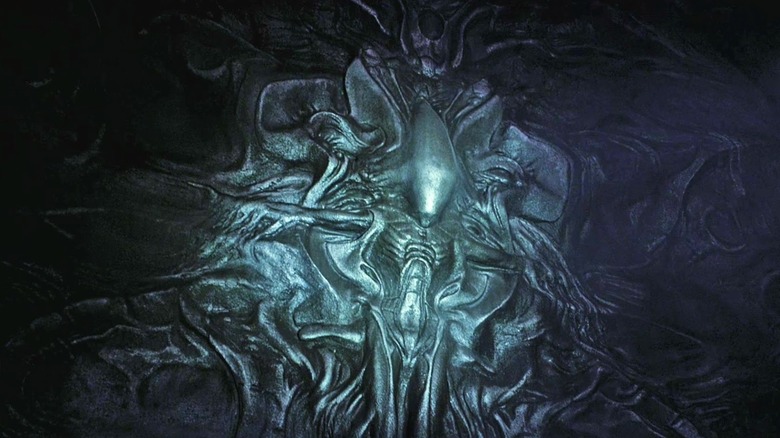Prometheus Is Absolutely Crucial To Ridley Scott's Alien Franchise
As one of the foremost defenders of oft-maligned films like "Grease 2" or M. Night Shyamalan's "The Happening," I've gotten pretty comfortable living on Subjective Film Opinion Island, even if sometimes I'm living alone. While "Alien" and "Aliens" are rightfully considered classics by, well, everyone, the general consensus on the rest of the franchise isn't as predictable. Films like "Alien 3" and even "Alien: Resurrection" have had their reassessments over the years, and "Alien: Covenant" has rightfully taken the crown as the franchise's most misunderstood and underrated.
However, Ridley Scott's first film of his prequel duology, "Prometheus," arguably remains the series' most controversial. When it debuted in 2012, critic Germain Lussier wrote for /Film that the film "ends up feeling like a hundred people tried to shove their own ideas into a single movie." Five years later, Matt Monagle wrote an impassioned defense of the film, declaring it "one of the boldest science fiction movies in recent memory" for our former column, "The Unpopular Opinion."
Well, seven years later, I am joining Team Monagle by also saying that "Prometheus" is not just an excellent science fiction film, it's one of the most crucial films in the entire franchise. Most sci-fi films approach the creation of mankind through natural evolution, but Scott incorporates science with the Greek mythology from which the film gets its name. The son of Titans who stole fire from the Gods and gave it to assist the humans is punished by being bound to a rock so that an Eagle could peck out his liver (the organ the Greeks associated with emotion).
I've heard the chorus of complaints — that as a prequel, it doesn't explain the founding of Weyland-Yutani and that it doesn't feel like an "Alien" movie — but that doesn't stop "Prometheus" from being not just essential, but mandatory viewing.
Prometheus is integral to Ridley Scott's franchise
The myth of Prometheus is what inspires founder Peter Weyland to fund the mission of Dr. Elizabeth Shaw, pursuing a star map that aligns with other maps from ancient cultures, leading them to believe this area contains the missing link between humanity and our true forerunners, the Engineers. But our makers have no interest in meeting us. They are not impressed by the results of their creation, and instead want us obliterated from existence. It's hard not to think of the countless followers of religions who believe meeting their version of God would be the greatest experience imaginable. "Prometheus" posits that it's much better that we do not.
When the team meets an Engineer, Weyland admits that he funded the trip to "steal the fire" for himself, so to speak. He orders David (named for Michelangelo's statue), his own android creation (making him a God or Dr. Frankenstein, depending on your interpretation), to learn the secret to eternal life by asking the Engineer ... who responds by ripping his head off and using it as a weapon to kill Weyland. His hubris, audacity, and desire to play God resulting in the disrespect of the Engineers are ultimately his undoing. The Xenomorphs? Why, they are merely the Eagles of Zeus, hungering for our livers. But "Prometheus" doesn't provide us an answer as to why the Engineers hate us so much, creatures derived from their own black liquid DNA. But do we need to ask them why? Do we really need the Engineers to tell us the truth? Personally, I think we already know the answer, and "Prometheus" forcing us to say it with our own voices makes us too uncomfortable to accept.
Several members of the /Film team ranked the "Alien" movies, including "Prometheus," on today's episode of the /Film Daily podcast, which you can listen to below:
You can subscribe to /Film Daily on Apple Podcasts, Overcast, Spotify, or wherever you get your podcasts, and send your feedback, questions, comments, concerns, and mailbag topics to us at bpearson@slashfilm.com. Please leave your name and general geographic location in case we mention your e-mail on the air.

